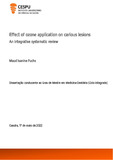| dc.contributor.advisor | SOUSA, ARNALDO BARBOSA ALVES DE | |
| dc.contributor.author | Fuchs, Maud Isanine | |
| dc.date.accessioned | 2022-10-20T10:45:27Z | |
| dc.date.available | 2022-10-20T10:45:27Z | |
| dc.date.issued | 2022 | |
| dc.identifier.uri | http://hdl.handle.net/20.500.11816/3967 | |
| dc.description.abstract | Introdução: A cárie dentária é uma doença multifatorial preocupante caracterizada pela desmineralização do dente. O tratamento tradicional muitas vezes traz medo e dor, por isso abordagens minimamente invasivas estão a crescer em popularidade para preservar a estrutura dentária. O ozono, um poderoso agente oxidante e antibacteriano, pode eliminar microrganismos envolvidos na lesão cariosa, impedindo o seu progresso e levando à paragem (controle) da infeção cariosa.
Objetivo: Avaliar o efeito clínico e antibacteriano do ozono nas lesões cariosas em comparação com o tratamento atual.
Materiais e métodos: A pesquisa foi realizada no Pubmed entre 2012 e Fevereiro de 2022, incluindo ensaios clínicos e ensaios controlados randomizados. Dos 33 artigos iniciais, 10 foram incluídos na revisão sistemática.
Resultados: Os estudos demonstraram que a aplicação de gás de ozono em lesões cariosas aumentou a remineralização, diminuindo a progressão da cárie, e teve um efeito antibacteriano importante para melhorar o sucesso do tratamento minimamente invasivo da cárie. No entanto, o efeito do ozono só atinge a parte externa da lesão.
Conclusão: O uso de ozono, um tratamento minimamente invasivo e indolor, como suporte ao tratamento clínico da cárie é promissor, mas mais estudos devem ser realizados para confirmar o potencial do ozono e determinar com mais precisão o tempo certo de aplicação e a concentração. | pt_PT |
| dc.description.abstract | Introduction: Dental carie is a preoccupying multifactorial disease characterized by the demineralization of the tooth. The traditional treatment often brings fear and pain so that minimally invasive approaches to preserve tooth structure are growing in popularity. Ozone, a powerful oxidant, and antibacterial agent, can eliminate microorganisms involved in the carious lesion, preventing its progress, and leading to carious arrest.
Objective: To assess the clinical and antibacterial effect of ozone on carious lesions compared to current carie treatment.
Materials and methods: The research was carried out on PubMed between 2012 and February 2022 including randomized controlled trials and clinical trials. From the initial 33 articles, 10 were included in the systematic review.
Results: The studies demonstrated that ozone gas application on carious lesions enhanced remineralization, decreasing the progression of the carie, and had an important antibacterial effect to improve the success of minimally invasive carie treatment. However, ozone’s effect only reaches outer parts of the lesion.
Conclusion: As a support to carie clinical care, the use of ozone, a minimally invasive, painless, and rapid treatment, is promising. Nevertheless, more studies with similar protocols must be performed to confirm ozone’s potential and determine more precisely the optimal duration of application and concentration. | pt_PT |
| dc.language.iso | por | pt_PT |
| dc.rights | info:eu-repo/semantics/openAccess | pt_PT |
| dc.subject | Dentistry | pt_PT |
| dc.subject | Ozone | pt_PT |
| dc.subject | Dental caries | pt_PT |
| dc.subject | Tooth remineralization | pt_PT |
| dc.title | Effect of ozone application on carious lesion An integrative systematic review | pt_PT |
| dc.type | info:eu-repo/semantics/masterThesis | pt_PT |
| dc.identifier.tid | 203052382 | pt_PT |
| thesis.degree.name | Mestrado em Medicina Dentária | pt_PT |

